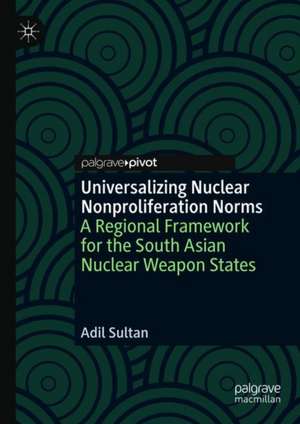Universalizing Nuclear Nonproliferation Norms: A Regional Framework for the South Asian Nuclear Weapon States
Autor Adil Sultanen Limba Engleză Hardback – 14 noi 2018
Preț: 418.83 lei
Nou
Puncte Express: 628
Preț estimativ în valută:
80.14€ • 83.98$ • 66.25£
80.14€ • 83.98$ • 66.25£
Carte tipărită la comandă
Livrare economică 11-25 aprilie
Preluare comenzi: 021 569.72.76
Specificații
ISBN-13: 9783030013332
ISBN-10: 3030013332
Pagini: 138
Ilustrații: XII, 158 p.
Dimensiuni: 148 x 210 mm
Greutate: 0.36 kg
Ediția:1st ed. 2019
Editura: Springer International Publishing
Colecția Palgrave Pivot
Locul publicării:Cham, Switzerland
ISBN-10: 3030013332
Pagini: 138
Ilustrații: XII, 158 p.
Dimensiuni: 148 x 210 mm
Greutate: 0.36 kg
Ediția:1st ed. 2019
Editura: Springer International Publishing
Colecția Palgrave Pivot
Locul publicării:Cham, Switzerland
Cuprins
1. Introduction.- 2. South Asian proliferation puzzle.- 3. The nuclear nonproliferation regime.- 4. Pakistan and India’s approaches towards arms control and disarmament.- 5. Technology Control Regimes (TCRs).- 6. Nuclear Governance in South Asia.- 7. Nuclear confidence building measures (CBMs) in South Asia.- 8. Regional Non-Proliferation Regime (RNR).
Recenzii
“This book and the framework it pronounces are solid and viable. The more India and Pakistan mend fences, the chances of its implementation will increase. Sultan’s study has made an important contribution in nonproliferation-related literature. The study’s main conclusions are instructive for practitioners and scholars alike. It also throws more research puzzles for South Asian watchers.” (Syed Ali Zia Jaffery, pakistanpolitico.com, 15 January, 2019)
Notă biografică
Adil Sultan is Visiting Research Fellow at the Centre for Science and Security Studies (CSSS), Department of War Studies, King’s College London, UK. He has worked for over 13 years on nuclear arms control issues at Pakistan’s Strategic Plans Division (SPD).
Textul de pe ultima copertă
This book suggests a new bargain between the NPT nuclear weapon states and the non-NPT nuclear weapons possessor states, mainly India and Pakistan, through a regional arrangement to help move towards universalization of the nuclear nonproliferation regime. The author analyses nuclear proliferation drivers to understand why states acquire and justify possession of nuclear weapons even though most nuclear weapon states no longer are faced with an existential threat to their national security. This study also identifies various challenges being faced by the NPT based nuclear nonproliferation regime, which if left unaddressed, could unravel the nonproliferation regime. It also offers the history of confidence building measures between India and Pakistan, which could be a useful reference for negotiating a Regional Nonproliferation Regime (RNR) in the future.
Adil Sultan is Visiting Research Fellow at the Centre for Science and Security Studies (CSSS), Department of War Studies, King’s College London, UK. He has worked for over 13 years on nuclear arms control issues at Pakistan’s Strategic Plans Division (SPD).
Adil Sultan is Visiting Research Fellow at the Centre for Science and Security Studies (CSSS), Department of War Studies, King’s College London, UK. He has worked for over 13 years on nuclear arms control issues at Pakistan’s Strategic Plans Division (SPD).
Caracteristici
Offers a South Asian perspective with a focus on Pakistan and India’s security imperatives that continue to shape their nuclear choices Provides a detailed account of NPT based global nonproliferation regime and identifies contemporary challenges Explores why global nonproliferation and disarmament efforts have not been able to achieve the intended objectives
